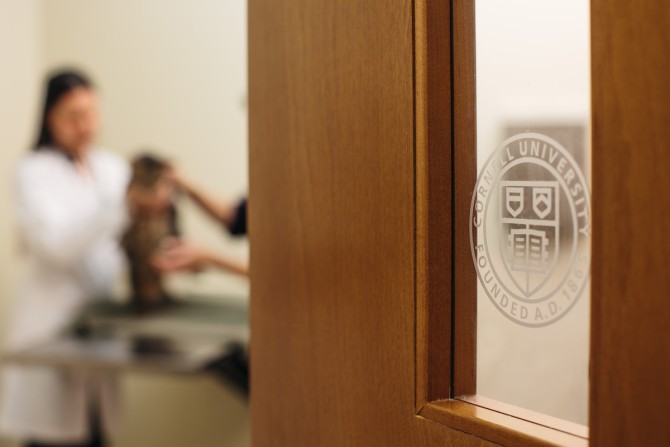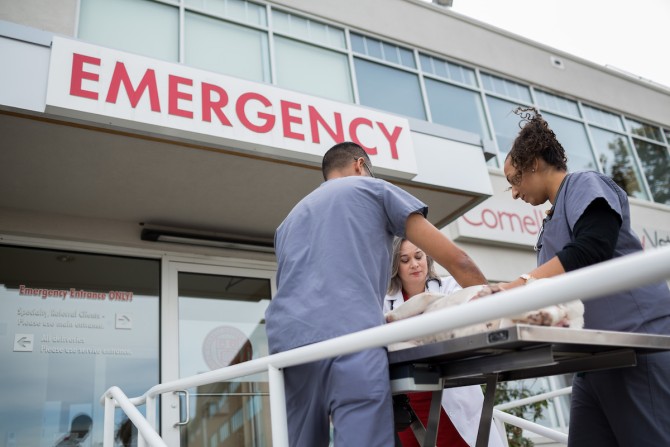News directly from Cornell's colleges and centers
Cornell University Veterinary Specialists celebrates 10 years of providing care to animals
By Melanie Greaver Cordova
This year marks 10 years since the opening of Cornell University Veterinary Specialists (CUVS), which provides veterinary specialty and emergency care in Stamford, Connecticut. In the decade since, clinicians have treated and saved the lives of tens of thousands of patients.
Dr. Susan Hackner, chief medical officer and chief operating officer of the hospital since its inception, is fully committed to continuing the hospital’s excellence in its tenth year and beyond. “First and foremost, CUVS was intended to be a model for outstanding veterinary specialty and emergency care, and this continues to be our focus and the reason we get up every day,” Hackner said.
CUVS is a subsidiary of Cornell and the College of Veterinary Medicine, owned in full by the university and governed by a board of directors, of which Lorin D. Warnick, D.V.M., Ph.D. ’94, the Austin O. Hooey Dean of Veterinary Medicine, is chair. It provides specialty and emergency medicine only, and is open 24/7/365 for emergency cases.
CUVS was unique from the outset. “It brings together the best of academia with the best of private practice,” said Warnick. “Namely, the academic drive for the advancement of veterinary medicine, discovery and application of new knowledge, and a commitment to education, combined with a focus on communications, service and efficiency.”
This model is instrumental in Hackner and her team’s sustained success and strong relationships with clients over the decade. “We believe that this provides not only outstanding medical care but also a team approach that includes the pet's family as well as the referring veterinarian,” Hackner said.
The decision to open a referral and emergency clinic in the New York metro area emerged from the College of Veterinary Medicine’s strategic planning process, which included feedback from members of the college community, outside stakeholders and veterinarians. Cornell Provost Michael Kotlikoff, then dean of the college, approached Hackner with the immense project of bringing CUVS to life.
As the first hire, Hackner knew the clinic had to offer something different — a combination of advanced medicine together with a unique workplace culture and dedication to customer service. These principles are present within all 10 of the specialty services offered at CUVS: Emergency and critical care, internal medicine, surgery, oncology, ophthalmology, dermatology, radiology, dentistry and maxillofacial surgery, cardiology and anesthesiology.
The hospital has seen tremendous growth since opening in 2011. At the time, it had nine doctors among 36 staff. Today, CUVS has 25 doctors among 125 staff, and in the last fiscal year alone, it logged over 25,000 patient visits. In 2014, it received level-1 certification from the Veterinary Emergency and Critical Care Society, distinguishing the clinic as a facility at the highest level of emergency and critical care. CUVS is one of exceedingly few level-1 facilities in the tri-state area and one of only approximately 30 nationwide. Beyond being designed to handle the most complicated and emergent of cases, CUVS is also physically structured to foster learning. It features a tiered auditorium and overnight rooms for rotating students and residents, delivers continuing education programming to veterinarians in the New York metropolitan area, and provides learning opportunities for pet owners.
“Cornell University Veterinary Specialists expanded Cornell’s role in specialty medicine by creating an integrated veterinary medical center that supports clinical research and expands the educational experience for veterinary residents as well as students seeking their doctor of veterinary medicine degree,” Hackner said.
Raising up residents
Its residency program is a point of pride for CUVS. Having evolved alongside the hospital’s many other educational and training ventures, the emergency and critical care residency training program has successfully graduated specialists who now practice across the country. Currently, the program has six residents, up from two or three in past years. Dr. Bridget Lyons, program lead and emergency and critical care head of service, hopes to continue this class size moving forward.
“The residency program at CUVS is accredited by the American College of Veterinary Emergency Critical Care and prepares residents not only to take their board exam, but also to practice high-quality critical care and emergency medicine,” Lyons said. “This preparation takes place via immersive clinical training and mentorship, together with didactic teaching in the form of board review, journal clubs and rounds.”
Residents benefit from the dual academic and private practice atmosphere at CUVS. As the largest university-affiliated veterinary referral center in the country, they are exposed to a busy practice environment with a large, diverse metropolitan referral caseload and a client base seeking advanced treatments for their pets.
Residents also rotate through the Cornell University Hospital for Animals (CUHA) in Ithaca, which allows for training with a variety of different criticalists beyond those in Stamford, Lyons said. “In addition, they benefit from being in a different academic environment at CUHA, where they can participate in student and intern teaching, further preparing them for leadership positions in their future endeavors,” she said.
The CUVS team also runs an externship program for veterinary students from Cornell and other veterinary schools domestically and abroad, and a veterinary technician externship program for regional schools. This is in addition to internal technician training programs, mentoring programs for veterinary technician specialists, as well as a robust continuing education series for veterinarians and other veterinary professionals, including a large annual conference.
“As part of Cornell, we are committed to a culture of lifelong learning and advancing the profession,” Hackner said.
As they look forward to the next 10 years, Hackner said CUVS will continue its dedication to its original mission, while also growing and evolving to better advance the medicine they provide and the knowledge they foster. “We’ll continue to listen to our clients and referring veterinarians so that we can meet their needs — and exceed them,” she said.
Melanie Greaver Cordova is assistant director of communications at the College of Veterinary Medicine.
Media Contact
Get Cornell news delivered right to your inbox.
Subscribe


